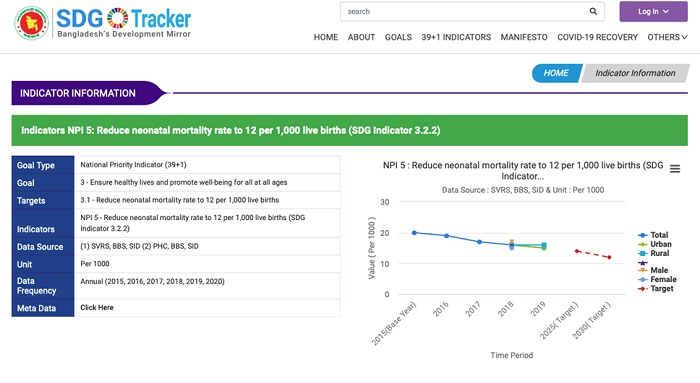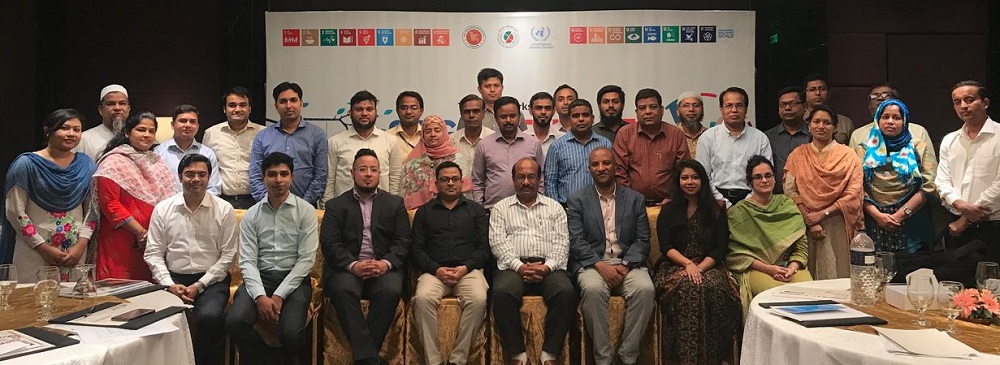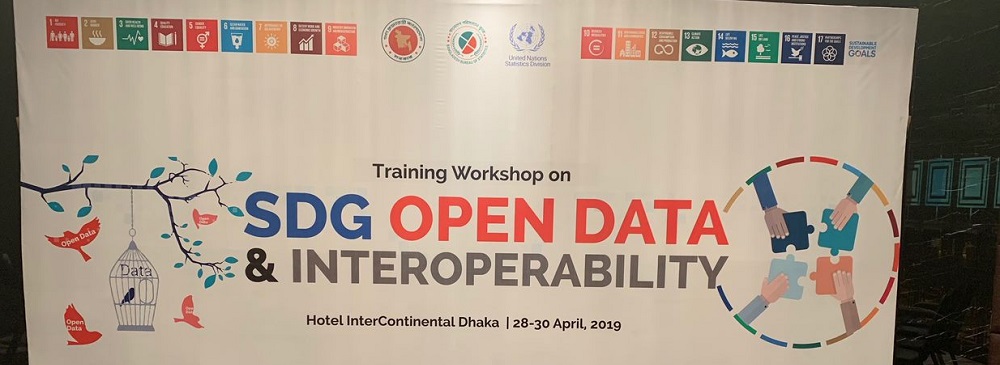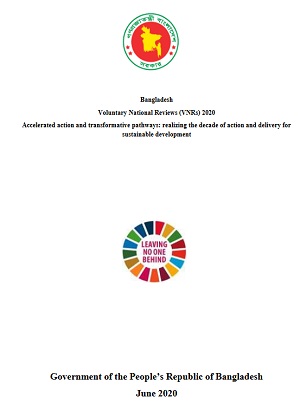Bangladesh
I. General on SDG monitoring set up
National SDG organizational set up
After the adoption of 2030 Agenda for Sustainable Development in 2015, Prime Minister Sheikh Hasina constituted an inter-ministerial “SDGs Implementation and Review Committee” comprised of Secretaries from 20 Ministries, for coordinating SDGs implementation and review. The Principal Coordinator (SDGs Affairs), a high-level position created at the Prime Minister’s Office, heads the Committee.
Bangladesh has adopted the Whole-of-the-Society approach for SDGs implementation involving government machinery, NGOs, INGOs, CSOs, development partners, private sector, business people, academia, professionals, local authority, Member of Parliament and engaging other relevant stakeholders. Following the Allocation of Business of the Government of Bangladesh, Ministries/Divisions have been assigned with the responsibility of implementing the targets of SDGs tagging them as lead, co-lead, or associate. The lead Ministries/Divisions in consultation with co-lead and associate Ministries/Divisions have prepared SDGs Action Plan highlighting new projects to be implemented to achieve SDGs targets.
An “SDGs Working Team” has been formed with the Director-General, Governance Innovation Unit of the Prime Minister’s Office as the Chair, and members including government officials, academia, CSOs and private sector representatives. The team is responsible for providing recommendations to the 'SDGs Implementation and Review' Committee' on SDGs implementation.
Besides the national committee, the Cabinet Division has formed three committees for better implementation and coordination of SDGs localization works at the Divisional, District and Sub-district levels, which are chaired by Divisional Commissioner, Deputy Commissioner (DC) and Upazila Nirbahi Officer (UNO) respectively.
National set of SDG indicators
The Government of Bangladesh is in the process of localizing SDGs, particularly in the District and Upazila level. On 3rd December 2018, the cabinet approved 40 (39+1) priority indicators for localization of SDGs; 39 indicators from 17 Goals were selected which were considered to be (a) crucial for the local level of our country and (b) producing reinforcing effects on other Targets. An additional priority indicator was left to achieve ‘leaving no one behind’ according to the circumstances of a specific District or Sub-district, meeting the ground reality of that particular geographical area.
SDG reports and Voluntary National Reviews
Bangladesh submitted its second Voluntary National Review and presented it at the High Level Political Forum in New York in July 2020, following an initial VNR in 2017. As part of the VNR process, coordinating Ministries/Divisions conducted consultations meetings/workshops taking representatives from different stakeholders relevant to their goals and submitted their goal-wise progress reports. In the goal-wise consultations done by the coordinating Ministries/Divisions, 1317 stakeholders (28 per cent female; 20 per cent non-government) were present. Along with the progress against targets, they submitted good practices/ good cases, innovative cases, business cases, collaborative cases (partnership with GO-NGO, PPP) and leave no one behind (LNOB) with regard to that particular goal.
In addition, to have grassroots-level involvement in the VNRs process, Divisional Commissioners were requested to convene consultations locally, represented by local government officials and other stakeholders to send the implementation status of +1 of the (39+1) indicators of the localization of SDGs in Bangladesh.
Bangladesh’s national data platform, known as SDG Tracker, was launched by the Prime Minister at a UN General Assembly side-event in 2017.
SDG Tracker provides a web-based at creating a data repository, designed to provide up to date information on progress towards the goals, with a range of options for data visualisation and download. It aims to strengthen timely data collection and improve situation analysis and performance monitoring of achieving the SDGs along with other national development goals.

Bangladesh Bureau of Statistics (BBS), Statistics and Informatics Division (SID) in partnership with the Cabinet Division and the Prime Minister's Office- in collaboration with General Economics Division (GED) of Planning Commission and other government and private stakeholders, designed and developed SDG Tracker. The access to Information (a2i) Programme of ICT Division provides the technological and knowledge support for the platform.
Overall coordination of National Statistical System
The Bangladesh Bureau of Statistics (BBS) is at the centre of the NSS in Bangladesh. BBS is led by a Director General, who is assisted by a Deputy DG and a number of Directors. The BBS has a decentralized network to carry out its activities. The head office of the BBS is located in Dhaka. There are 23 Regional Statistical Offices (RSO) in the larger districts, 486 Upazila Statistical Offices at the Upazila level and 23 Thana Statistical Offices in the Metropolitan centres. BBS and the NSS in Bangladesh is controlled and regulated by the Statistics and Informatics Division under the Ministry of Planning.
A key milestone in the development of the NSS in Bangladesh has been the enactment of the Statistics Act, 2013 (Parishankhyan Ain, 2013), which has mandated BBS as the standalone agency for generating official statistics. It has empowered BBS to provide guidance other agencies for producing official statistics and to authenticate statistics generated by them.
The Statistics Act also gives BBS responsibility for preparing and updating the National Strategy for the Development of Statistics (NSDS). The NSDS covering the period through to 2023 was published in 2015.
SDG data coordination committees
The government has formed the “National Data Coordination Committee (NDCC)” to identify data gaps, ensure the availability of quality data and coordinate among ministries and divisions to make data available for SDGs and monitor other international commitments. The Committee is comprised of 50 members including all data producing agencies of the government and representatives from business associations, think tanks and academia; it is chaired by the Secretary, Statistics and Informatics Division.
Responsibility for SDG indicator compilation
Multiple agencies within the NSS in Bangladesh are responsible for the compilation of SDG indicators. The General Economics Division (GED) in collaboration with BBS and other relevant ministries/divisions published a data gaps analysis in 2017, which maps each indicator to a Ministry, Division or Agency responsible for generating or providing data. BBS, as the NSO of Bangladesh is responsible for providing data for 105 indicators of the SDGs. BBS is also the authority responsible for check the authenticity of data provided by the focal points of different ministries in the SDG Tracker System.
To foster the overall SDGs related activities BBS has established an ‘SDG Cell’ to coordinate the overall SDGs data-related activities in Bangladesh.
Data sharing across the NSS is facilitated by the Statistics Act, 2013. All the data generating ministries are able to provide data onto the back-end of the SDG Tracker, which is then authenticated by BBS before publishing. With the assistance of a2i programme, training has been delivered to the focal points from Ministries/Divisions/Agencies on the procedure of data submission to the SDGs tracker.
IV. Data availability and disaggregation
Work to make more indicators available
The latest SDGs Data Gap analysis revealed that 155 indicators data are currently available.
Work to allow more disaggregation
As of 27 Aug 2020, 83 indicators have at least one published disaggregation.
As part of the UNSD-FCDO project, UNSD provided remote training to a range of agencies within the NSS in Bangladesh on the compilation of metadata using the internationally agreed reporting template for both global and national metadata. In addition, BBS is also conducting further trainings and meetings with NSS agencies to sensitise them to the importance of national metadata. During the first half of 2021, with the support of the project, BBS intends to work with NSS partners to develop the national metadata in order to produce a published metadata handbook for the SDGs.
With support from the UNSD-FCDO project, BBS will be developing, adopting and starting to implement a user engagement strategy linked to SDG monitoring during the first half of 2021.
Implementation plan and activities
Proposed activities under the user engagement strategy include consultation workshops/meetings with stakeholders from the private sector, CSOs, media and government agencies, as well as a series of data literacy workshops held at the divisional level. A Round II user survey will also be conducted to assess the extent to which users are satisfied with the availability and quality of data and also the user friendliness of the SDG Tracker platform.
In response to the COVID-19 pandemic, Directorate General of Health Services (DGHS) together with a2i Programme and other stakeholders (Government institutions, telecom companies, development partners, NGOs, Academia, etc.) developed a data intelligence platform (https://www.corona.gov.bd) to minimize the fatalities based on data-driven decision- making. The analytics help to identify hotspots and high-risk cases, analyse and predict requirements for additional patient management and guide resource allocation (health workers, testing facilities, hospitals, isolation units, ICT, etc.) and guide the government with timely policy responses.


